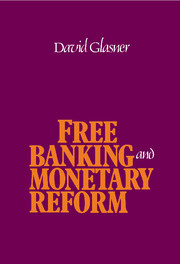Book contents
- Frontmatter
- Contents
- Preface
- Acknowledgments
- PART I A THEORY OF MONETARY INSTITUTIONS
- PART II THE UNCERTAIN PROGRESS OF MONETARY THEORY AND MONETARY REFORM
- PART III A COMPETITIVE MONETARY REGIME
- 8 The competitive breakthrough
- 9 Can competitive banking be safe and stable?
- 10 Why we need a new monetary regime
- 11 A proposal for monetary reform
- References
- Index
10 - Why we need a new monetary regime
Published online by Cambridge University Press: 16 September 2009
- Frontmatter
- Contents
- Preface
- Acknowledgments
- PART I A THEORY OF MONETARY INSTITUTIONS
- PART II THE UNCERTAIN PROGRESS OF MONETARY THEORY AND MONETARY REFORM
- PART III A COMPETITIVE MONETARY REGIME
- 8 The competitive breakthrough
- 9 Can competitive banking be safe and stable?
- 10 Why we need a new monetary regime
- 11 A proposal for monetary reform
- References
- Index
Summary
Old fetishes of so-called international bankers are being replaced by efforts to plan national currencies with the objective of giving to those currencies a continuing purchasing power which does not greatly vary in terms of the commodities and need of modern civilization. Let me be frank in saying that the United States seeks the kind of dollar which a generation hence will have the same purchasing and debt-paying power as the dollar value we hope to attain in the near future. That objective means more to the good of other nations than a fixed ratio for a month or two in terms of the pound or franc.
Franklin D. RooseveltPresident Roosevelt is magnificently right.
John Maynard KeynesIn preceding chapters, I worked out a theory of how a deregulated, competitive banking system would work. As I have described it, such a system would be both highly efficient and, contrary to the conventional view, highly stable. But if a competitive banking system would be so wonderful, why, one might ask, has free banking been so uncommon?
I began answering that question in Chapter I when I explained why the primitive state established a monopoly over money. It did so, I argued, not to provide better money than private issuers might have offered, but to appropriate a source of revenue vital to its sovereignty.
- Type
- Chapter
- Information
- Free Banking and Monetary Reform , pp. 204 - 226Publisher: Cambridge University PressPrint publication year: 1989



